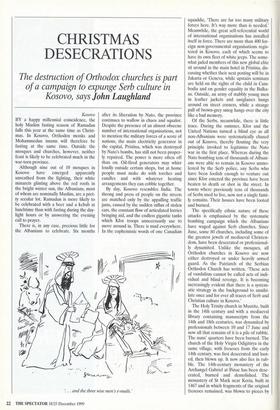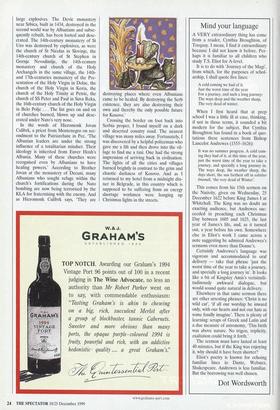CHRISTMAS DESECRATIONS
The destruction of Orthodox churches is part of a campaign to expunge Serb culture in Kosovo, says John Laughland
Kosovo BY a happy millennial coincidence, the holy Muslim fasting season of Ramadan falls this year at the same time as Christ- mas. In Kosovo, Orthodox monks and Mohammedan imams will therefore be fasting at the same time. Outside the mosques and churches, however, neither feast is likely to be celebrated much in the war-torn province.
Although nine out of 10 mosques in Kosovo have emerged apparently unscathed from the fighting, their white minarets glinting above the red roofs in the bright winter sun, the Albanians, most of whom are nominally Muslim, are a pret- ty secular lot. Ramadan is more likely to be celebrated with a beer and a kebab at lunchtime than with fasting during the day- light hours or by answering the evening call to prayer.
There is, in any case, precious little for the Albanians to celebrate. Six months after its liberation by Nato, the province continues to wallow in chaos and squalor. Despite the presence of an almost obscene number of international organisations, not to mention the military forces of a score of nations, the main electricity generator in the capital, Pristina, which was destroyed by Nato's bombs, has still not been proper- ly repaired. The power is more often off than on. Oil-fired generators may whirr loudly outside certain shops, but at home people must make do with torches and candles and with whatever heating arrangements they can cobble together.
By day, Kosovo resembles India. The throng and press of people on the streets are matched only by the appalling traffic jams, caused by the sudden influx of stolen cars, the constant flow of articulated lorries bringing aid, and the endless gigantic tanks which Kfor troops unnecessarily use to move around in. There is mud everywhere. In the euphemistic words of one Canadian
. . and the three wise men's e-mails.'
squaddie, 'There are far too many military forces here. It's way more than is needed.' Meanwhile; the great self-referential world of international organisations has installed itself in force. There are more than 400 for- eign non-governmental organisations regis- tered in Kosovo, each of which seems to have its own fleet of white jeeps. The some- what jaded members of this new global elite sit around in the main hotel in Pristina, dis- cussing whether their next posting will be in Jakarta or Geneva, while upstairs seminars are held on the rights of the child in Cam- bodia and on gender equality in the Balka- ns. Outside, an army of stubbly young men in leather jackets and sunglasses hangs around on street corners, while a strange pall of brown-grey smog hangs over the city like a bad memory.
Of the Serbs, meanwhile, there is little trace. During the summer, Kfor and the United Nations turned a blind eye as all non-Albanians were systematically chased out of Kosovo, thereby flouting the very principle invoked to legitimise the Nato war in the first place. Whereas during the Nato bombing tens of thousands of Albani- ans were able to remain in Kosovo unmo- lested by the Serb police, any Serbs who have been foolish enough to venture out since Kfor entered the province have been beaten to death or shot in the street. In towns where previously tens of thousands of Serbs used to live, now not a single fami- ly remains. Their houses have been looted and burned.
The specifically ethnic nature of these attacks is emphasised by the systematic bombing campaign which the Albanians have waged against Serb churches. Since June, some 80 churches, including some of the greatest jewels of mediaeval Christen- dom, have been desecrated or professional- ly dynamited. Unlike the mosques, all Orthodox churches in Kosovo are now either destroyed or under heavily armed guard. As the Patriarch of the Serbian Orthodox Church has written, 'These acts of vandalism cannot be called acts of indi- vidual and blind revenge. It is becoming increasingly evident that there is a system- atic strategy in the background to annihi- late once and for ever all traces of Serb and Christian culture in Kosovo.'
The Holy Trinity church in Muutite, built in the 14th century and with a mediaeval library containing manuscripts from the 14th and 18th centuries, was dynamited by professionals between 10 and 17 June and now all that remains of it is a pile of rubble. The nuns' quarters have been burned. The church of the Holy Virgin Odigitirya in the same village, with frescoes from the early 14th century, was first desecrated and loot- ed, then blown up. It now also lies in rub- ble. The 14th-century monastery of the Archangel Gabriel at Binac has been dese- crated, burned and demolished. The monastery of St Mark near Koria, built in 1467 and in which fragments of the original frescoes remained, was blown to pieces by large explosives. The Devic monastery near Srbica, built in 1434, destroyed in the second world war by Albanians and subse- quently rebuilt, has been looted and dese- crated. The 14th-century monastery of St Uro was destroyed by explosives, as were the church of St Nicolas in Slovinje, the 14th-century church of St Stephen in Gornje Nevodimlje, the 14th-century monastery and church of the Holy Archangels in the same village, the 14th- and 17th-centuries monastery of the Pre- sentation of the Holy Virgin in Dolac, the church of the Holy Virgin in Koria, the church of the Holy Trinity at Petric, the church of SS Peter and Paul in Suva Reka, the 16th-century church of the Holy Virgin in Belo Polje . . . The list goes on and on of churches burned, blown up and dese- crated under Nato's very nose.
In the words of Hieromonk Jovan Culibrk, a priest from Montenegro on sec- ondment to the Patriarchate in Pec, 'The Albanian leaders are under the strong influence of a totalitarian mindset. Their ideology is inherited from Enver Hoxh's Albania. Many of these churches were recognised even by Albanians to have healing powers.' According to Brother Jovan at the monastery of Decani, many Albanians who sought refuge within the church's fortifications during the Nato bombing are now being terrorised by the KLA for fraternising with the enemy. And as Hieromonk Culibrk says, 'They are destroying places where even Albanians came to be healed. By destroying the Serb existence, they are also destroying their own and thereby the only possible future for Kosovo.'
Crossing the border on foot back into Serbia proper, I found myself on a dark and deserted country road. The nearest village was many miles away. Fortunately, I was discovered by a helpful policeman who gave me a lift and then drove into the vil- lage to find me a taxi. One had the strong impression of arriving back in civilisation. The lights of all the cities and villages burned brightly in contrast to the grim and chaotic darkness of Kosovo. And as I returned to my hotel from a midnight din- ner in Belgrade, in this country which is supposed to be suffering from an energy shortage workmen were hanging up Christmas lights in the streets.























































































































 Previous page
Previous page